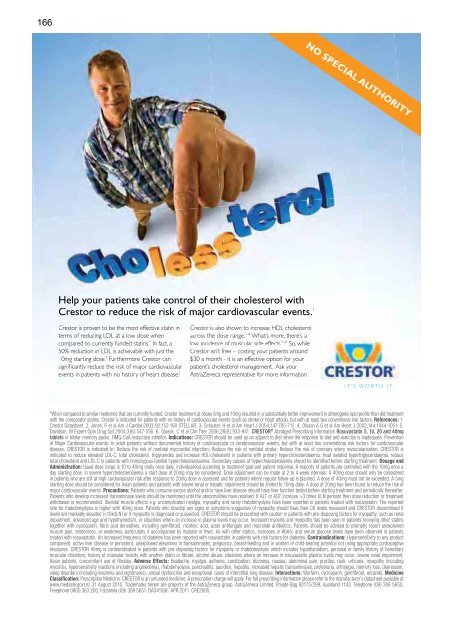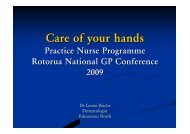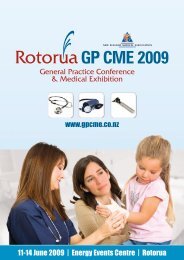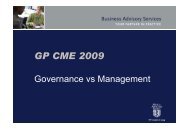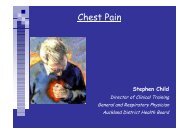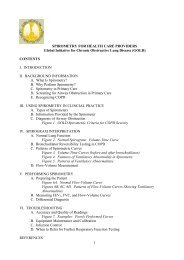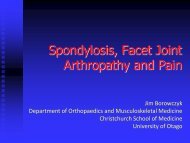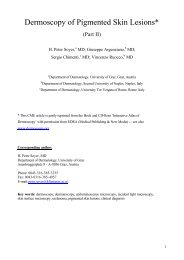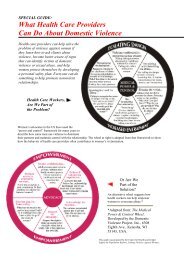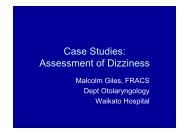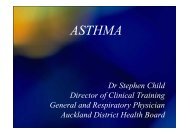DOWNLOAD GP CME 2010 PROCEEDINGS BOOKLET (18mb PDF)
DOWNLOAD GP CME 2010 PROCEEDINGS BOOKLET (18mb PDF)
DOWNLOAD GP CME 2010 PROCEEDINGS BOOKLET (18mb PDF)
You also want an ePaper? Increase the reach of your titles
YUMPU automatically turns print PDFs into web optimized ePapers that Google loves.
166<br />
NO SPECIAL AUTHORITY<br />
Help your patients take control of their cholesterol with<br />
Crestor to reduce the risk of major cardiovascular events. 1<br />
Crestor is proven to be the most effective statin in<br />
terms of reducing LDL at a low dose when<br />
compared to currently funded statins. * In fact, a<br />
50% reduction in LDL is achievable with just the<br />
10mg starting dose. 1 Furthermore Crestor can<br />
significantly reduce the risk of major cardiovascular<br />
events in patients with no history of heart disease. 1<br />
Crestor is also shown to increase HDL cholesterol<br />
across the dose range. 1-4 What’s more, there’s a<br />
low incidence of muscular side effects. 5-6 So, while<br />
Crestor isn’t free – costing your patients around<br />
$30 a month - it is an effective option for your<br />
patient’s cholesterol management. Ask your<br />
AstraZeneca representative for more information.<br />
IT’S WORTH IT.<br />
*When compared to similar medicines that are currently funded, Crestor treatment at doses 5mg and 10mg resulted in a substantially better improvement in atherogenic lipid profile than did treatment<br />
with the comparator statins. Crestor is indicated for patients with no history of cardiovascular events (such as stroke or heart attack), but with at least two conventional risk factors. References: 1.<br />
Crestor Datasheet. 2. Jones, P et al Am J Cardiol 2003;92:152-160 STELLAR. 3. Schuster, H et al Am Heart J 2004;147:705-712. 4. Olsson A G et al Am Heart J 2002;144;1044-1051. 5.<br />
Davidson, M Expert Opin Drug Saf 2004;3(6):547-556. 6. Glueck, C et al Clin Ther 2006;28(6):933-941. CRESTOR ® Abridged Prescribing Information Rosuvastatin 5, 10, 20 and 40mg<br />
tablets in blister memory packs. HMG-CoA reductase inhibitor. Indications: CRESTOR should be used as an adjunct to diet when the response to diet and exercise is inadequate. Prevention<br />
of Major Cardiovascular events: In adult patients without documented history of cardiovascular or cerebrovascular events, but with at least two conventional risk factors for cardiovascular<br />
disease, CRESTOR is indicated to: Reduce the risk of nonfatal myocardial infarction; Reduce the risk of nonfatal stroke; Reduce the risk of coronary artery revascularisation. CRESTOR is<br />
indicated to reduce elevated LDL-C, total cholesterol, triglycerides and increase HDL-cholesterol in patients with primary hypercholesterolaemia, treat isolated hypertriglyceridaemia, reduce<br />
total cholesterol and LDL-C in patients with homozygous familial hypercholesterolaemia. Secondary causes of hypercholesterolaemia should be identified before starting treatment. Dosage and<br />
Administration: Usual dose range is 10 to 40mg orally once daily, individualised according to treatment goal and patient response. A majority of patients are controlled with the 10mg once a<br />
day starting dose. In severe hypercholesterolaemia a start dose of 20mg may be considered. Dose adjustment can be made at 2 to 4 week intervals. A 40mg dose should only be considered<br />
in patients who are still at high cardiovascular risk after response to 20mg dose is assessed and for patients where regular follow-up is planned. A dose of 40mg must not be exceeded. A 5mg<br />
starting dose should be considered for Asian patients and patients with severe renal or hepatic impairment should be limited to 10mg daily. A dose of 20mg has been found to reduce the risk of<br />
major cardiovascular events. Precautions: Patients who consume excess alcohol and/or have liver disease should have liver function tested before starting treatment and periodically thereafter.<br />
Patients who develop increased transaminase levels should be monitored until the abnormalities have resolved. If ALT or AST increase >3 times ULN persists then dose reduction or treatment<br />
withdrawal is recommended. Skeletal muscle effects e.g. uncomplicated myalgia, myopathy and rarely rhabdomyolysis have been reported in patients treated with rosuvastatin. The reported<br />
rate for rhabdomyolysis is higher with 40mg dose. Patients who develop any signs or symptoms suggestive of myopathy should have their CK levels measured and CRESTOR discontinued if<br />
levels are markedly elevated (>10xULN) or if myopathy is diagnosed or suspected. CRESTOR should be prescribed with caution in patients with pre-disposing factors for myopathy, such as renal<br />
impairment, advanced age and hypothyroidism, or situations where an increase in plasma levels may occur. Increased myositis and myopathy has been seen in patients receiving other statins<br />
together with cyclosporin, fibric acid derivatives, including gemfibrozil, nicotinic acid, azole antifungals and macrolide antibiotics. Patients should be advised to promptly report unexplained<br />
muscle pain, tenderness, or weakness, particularly if accompanied by malaise or fever. As with other statins, increases in HbA1c and serum glucose levels have been observed in patients<br />
treated with rosuvastatin. An increased frequency of diabetes has been reported with rosuvastatin in patients with risk factors for diabetes. Contraindications: Hypersensitivity to any product<br />
component, active liver disease or persistent, unexplained elevations in transaminases, pregnancy, breast-feeding and in women of child-bearing potential not using appropriate contraceptive<br />
measures. CRESTOR 40mg is contraindicated in patients with pre-disposing factors for myopathy or rhabdomyolysis which includes hypothyroidism, personal or family history of hereditary<br />
muscular disorders, history of muscular toxicity with another statin or fibrate, alcohol abuse, situations where an increase in rosuvastatin plasma levels may occur, severe renal impairment,<br />
Asian patients, concomitant use of fibrates. Adverse Effects: Headache, myalgia, asthenia, constipation, dizziness, nausea, abdominal pain, pruritus, rash, urticaria, myopathy (including<br />
myositis), hypersensitivity reactions (including angioedema), rhabdomyolysis, pancreatitis, jaundice, hepatitis, increased hepatic transaminases, proteinuria, arthralgia, memory loss, depression,<br />
sleep disorders (including insomnia and nightmares), sexual dysfunction and exceptional cases of interstitial lung disease. Interactions: Warfarin, cyclosporin, gemfibrozil, antacids. Medicine<br />
Classification: Prescription Medicine. CRESTOR is an unfunded medicine. A prescription charge will apply. For full prescribing information please refer to the manufacturer’s datasheet available at<br />
www.medsafe.govt.nz 31 August <strong>2010</strong>. Trademarks herein are property of the AstraZeneca group. AstraZeneca Limited, Private Bag 92175/299, Auckland 1142. Telephone (09) 306 5650,<br />
Freephone 0800 363 200, Facsimile (09) 306 5651. DA3410GF. APR 2011. CRE2085.


